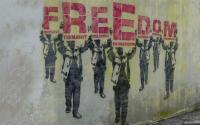Comomn Dreams/ Published on Friday, February 21, 2003 by the lndependent/UKby Adrian Hamilton
When the history of the Iraqi crisis of 2003 is finally written, what future generations may find most extraordinary is the absence of any political or diplomatic preparation for it. Against all the normal rules of politics, there has been remarkably little attempt to prepare public opinion with a readily understandable message of causes or consequences.
Even more striking has been the absence of any concerted attempt to form a cohesive international alliance behind invasion. Even in the latest British-American effort to frame a second resolution in the United Nations, there is a distinct sense of going through the motions, of it really not mattering whether France and Russia go along with it or not so long as they can be bribed or cajoled into not vetoing it. As one seasoned European diplomat asked plaintively this week: "Does Washington really care what the French, or anyone else for that matter, thinks?"
The answer is probably not, for the unique quality of this particular conflict is the way that it has been run by a relatively enclosed group within Washington acting on an agenda decided a long time ago – before 11 September in fact – which it sees no reason to explain or justify even to its own electorate, never mind its allies.
The result is a slightly unreal atmosphere for anyone visiting the US. Everyone assumes that the train has already left the station. On the television and in the newspapers there is virtually no debate as to whether it should have started moving, let alone whether it should be called back. Even the most solidly Democrat politicians and experts wheeled out in the endless discussion of the war on the news channels accept the rightness of the actions. If there is any debate it is limited to the speed of the train, and the need to get a few more allies on board, not the direction.
And yet talking to ordinary Americans – and the opinion polls bear this out – you get no sense of war fever or particular enthusiasm for the war. The rhetoric that proclaims America's power and belittles its doubting allies as "wimps", "pansies" or "cheese eaters" is limited to the media rather than conversations on the subway or the street. There one gets the feeling that if it was all called off tomorrow, most people would be quite content so long as it did not involve a climbdown for the nation.
One explanation for this disparity between a press and political establishment intent on war and a people far from fully engaged in it lies in the sense inevitability that permeates the discussion in the US. If it is going to happen anyhow, what is the point of debate?
Add to that the fact that war is a very long way away and that victory seems certain. The peace demonstrators in New York on Saturday were for the most part young and genuinely concerned at what Washington might be doing in their name. But where the Vietnam demonstrators were spurred by the sight of casualties and the real fear of the draft, today's anti-war activists are not directly involved. Afghanistan has blotted out the political taboo of the body bag. Donald Rumsfeld has promised a high-tech victory within weeks. The casualties will be among the civilians and they are the victims not of foreign invasion but Saddam's oppression.
At the same time those perceptions owe something to the nature of the media. In terms of political discourse, the multiplicity of channels has actually led to a diminution of debate as viewers and readers buy what they already agree with and the media make sure that this is what they are provided with.
There is no room in this world for comprehending Europe in terms of the feelings of its people rather than just the policy of its leaders, or of allowing other countries a right of free expression. Instead nations are seen as caricature images and their leaders as goodies or baddies depending on their relationship with America. And this applies as much to the European view of America as the other way round. We understand less of each other today than 50 years ago, not least because television images have made us think we know, whereas our forefathers sought to find out.
But the biggest reason for the marginalization of diplomacy is surely that it reflects the reality of politics in Washington today. The inner circle that runs the Bush administration takes no care of France or Germany because it believes – rightly so far as the military is concerned – that it does not need allies. Turkey and Kuwait may be needed as a launch pad for troops. Other nations' troops, in contrast to James Baker's meticulous pursuit of an inclusive alliance in the first Gulf War, are not seen as needed at all.
To London commentators the continued search for UN backing is seen as a credit to Tony Blair's power of persuasion. To Washington it is seen as helping out Blair in view of his own domestic troubles. Far from being seen as a staunch ally he has recently begun to look like a liability.
It's not sympathetic and it's certainly not comforting, but the Washington of George Bush has finally taken on the role once presumed by Henry Kissinger, the lone cowboy riding on a white horse to clean up the world wherever it threatens America's peace. And other countries' feelings or protestations just don't count at all.






